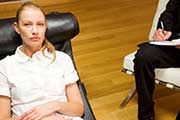
TUESDAY, Sept. 15, 2015 (HealthDay News) — A brain scan might someday help psychiatrists quickly determine which antipsychotic drugs work best for patients with schizophrenia or bipolar disorder, researchers say.
This personalized approach could eliminate a lot of trial-and-error and hasten critical time to treatment, the study authors suggested.
“The ultimate goal is to develop a strategy in which a simple brain scan could provide the necessary information to help select the best medication — or treatment approach — for an individual patient,” said study co-author Dr. Anil Malhotra, director of psychiatry research at the Zucker Hillside Hospital in New York City.
The test is still in the preliminary stages of research, and scientists want to improve its sensitivity before pushing to make it publicly available.
Psychotic illnesses such as schizophrenia and bipolar disorder affect about 3 percent of the general population, according to prior research. While there’s a perception that people with schizophrenia have multiple personalities, that’s not the case. Schizophrenia causes symptoms such as delusions and paranoia, and bipolar patients with severe episodes of mania or depression can have psychotic symptoms, too.
Powerful antipsychotic drugs such as Abilify (aripiprazole) and Risperdal (risperidone) are available to treat these mental illnesses. But it can take a long time for physicians to pinpoint the correct treatment, and side effects can be very difficult to experience.
“We have no way to predict how an individual patient with schizophrenia is going to respond to treatment,” Malhotra said. “Essentially, we use a trial-and-error approach to treatment choices.”
Patients may remain psychotic, leading to more costs and devastating consequences such as suicide. Or they may walk away from treatment.
In the new study, Malhotra and colleagues at the Feinstein Institute for Medical Research in Manhasset, N.Y., used functional-MRI brain scans to develop a measurement of how well two regions of the brain communicate with each other. The level of communication correlated partly with how well psychotic patients improved when they took certain antipsychotic drugs.
The researchers tried out the strategy on a group of 41 patients, aged 15 to 40, experiencing their first “psychotic break.” The patients underwent brains scans before they were randomly assigned to take risperidone or aripiprazole for a year.
Using information gained from that trial, the researchers tested their technique in 40 patients hospitalized for psychotic illness.
Seventy-six percent of the time, the investigators successfully predicted the response of the second group of patients to drug treatments.
The researchers said they hope to improve that number to 80 percent. “We were close to these goals with the current work and are now looking to launch additional research in this area to hopefully increase this signal to those levels,” said Malhotra.
The brain scans run from $300 to $700, Malhotra added. MRI brain scans do not use radiation and are not thought to have any immediate side effects.
Ultimately, he said, successful development of a test could lead to less time in the hospital for patients “and hopefully increased services and attention to those patients who may not be the best responders to treatment.”
Patients and families who want to know how rapidly a medication will work would welcome such a test, said Keith Nuechterlein, psychiatry professor at the University of California, Los Angeles, Semel Institute for Neuroscience and Human Behavior.
“Antipsychotic medications rarely work quickly, sometimes requiring weeks or months to resolve psychotic symptoms,” Nuechterlein said. A test like the one envisioned in the study “would be very useful in helping to give realistic expectations,” he added.
Knowing when a medication is likely to kick in also might help prevent patients from prematurely giving up on drugs, said Kenneth Subotnik, an adjunct professor of psychiatry at UCLA’s Semel Institute. Subotnik and Nuechterlein were not involved in the research.
The study was published online recently in the American Journal of Psychiatry.
More information
For more about psychotic illnesses, see the National Alliance on Mental Illness.
Copyright © 2026 HealthDay. All rights reserved.

